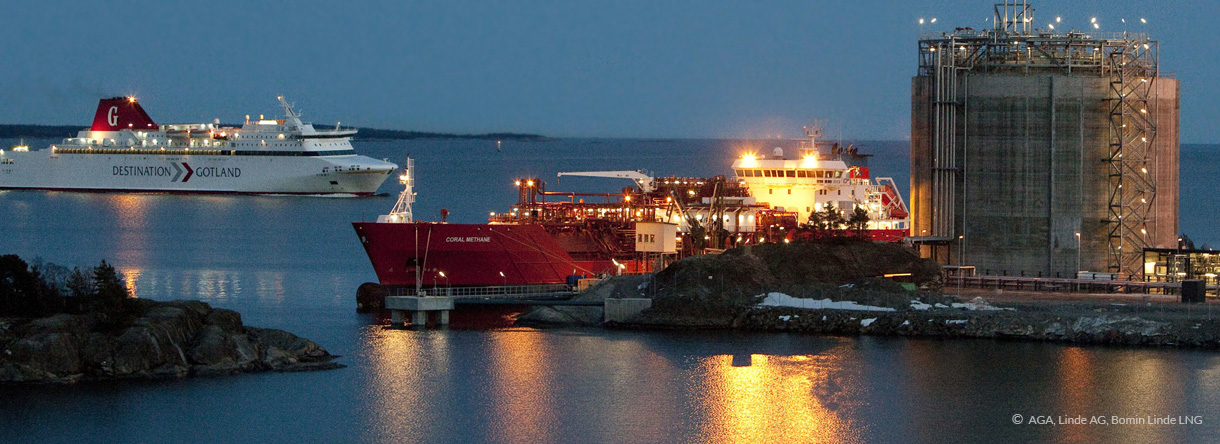Berlin, 22nd November 2017: Key stakeholders from business and politics discussed the importance of co-operation between commerce and logistics at an evening event of the German Maritime LNG Platform as this would enable a “maritime transition” to lower-emission shipping– without cost factors making this impossible. Panelists agreed that LNG plays a key role and discussed whether an import terminal will be part of the solution.
Following an invitation of the German Maritime LNG Platform, more than 80 representatives from the maritime, trade and the logistics sectors as well as environmental NGOs and politics came together at an evening event on 21st November in the Humboldt-Box in Berlin to discuss sustainable logistics and environmental and climate protection in shipping. Following a welcome speech by the initiator of the Platform, Hamburg’s former mayor, Ole von Beust, in which he highlighted the platform’s work of the past three years as a “success story”, business representatives presented their approaches to lower-emission logistics. Then, members of the German Bundestag and representatives of the federal states of Lower Saxony and Schleswig-Holstein explained their respective approaches to federal and regional policies.
In the beginning, Mahinde Abeynaike, CEO of Nauticor and Chairman of the Platform, emphasised that the use of LNG is more than an option today – as, increasingly, LNG is not just considered for ferries and cruise ships but also container ships – but that more needs to happen in Germany: “LNG has arrived, the demand increases worldwide but not in Germany. We need to talk about that.” A crucial tool to increase demand is the German LNG funding programme that the last German government has passed. Frank Bonaldo of the German Federal Economic Affairs Ministry assured the audience that the funding call will come this year. Dr Rowil Ponta, Managing Partner of Nordic Hamburg Shipmanagement presented Nordic’s four LNG-fuelled container ships for European routes which are currently built, with the option of building two more ships if the funding programme is finally implemented.
Markus Lange of Volkwagen Logistics and Björn Tiemann of Zippel Group explained their respective companies’ plans to progress sustainable logistics chains through two LNG-fuelled ships for the transport of cars (from 2019) and through the sustainable transport of ship containers on land. Jos Steeman, Vopak Germany, raised the question of an import terminal in Germany. The Dutch tank storage company Vopak and two partners currently check the feasibility of building an import terminal at Brunsbüttel. All panelists agreed: “An import terminal would make our efforts a lot easier.” Malte Siegert of the German environmental NGO NABU (Nature And Biodiversity Conservation Union) demanded more progress and called on companies to take on more responsibility and “ask more of your customers”. For him, this means: ”Commerce must set prices at a level that sustainable technologies, such as LNG, can be applied.”
The funding programme and the important terminal were issues that were raised again during the second discussion panel. Johann Saathoff, Social Democratic member of the German Bundestag, made clear that politicians now need to start considering the construction of an import structure, also with a view to security of supply. According to him, the funding programme took a long time coming. He said he was “speechless” that the maritime sector has to wait such a long time for the funding call:”That’s not what parliamentarians want.”
Rüdiger Kruse, Christian Democratic member of the German Bundestag, also called for a swift implementation of the funding programme as well as clear political leadership to support the maritime sector in reaching its sustainability objectives. Claudia Müller, Green member of the German Bundestag, demanded three measures: stricter emission limits, incentives for infrastructure development and support for the maritime sector for newly built and retrofitted ships. Ingelore Hering of the Economic Affairs and Transport Ministry in Lower Saxony demonstrated her support for a strong import infrastructure but also clarified that the federal states needed federal support for this. She said that an import terminal could also be built in Wilhelmshaven. Kurt-Christoph von Knobelsdorff from the Economic Affairs and Transport Ministry in Schleswig-Holstein made clear that Schleswig-Holstein fully supported an import terminal in Brunsbüttel but that federal support was needed.
Georg Ehrmann, Managing Director of the German Maritime LNG Platform, stated:
“Our discussions today have clearly demonstrated: LNG is the option of sustainable, lower-emission logistics and more environmental and climate protection in shipping. Therefore, we need the complete conversion of supply chains. This can only be achieved if all key stakeholders co-operate. We need the swift implementation of the German LNG funding programme, only then we will see more progress. The German maritime sector is at the ready with specific projects. Today, we’ve also received the clear signal that an LNG infrastructure will play a key part in further development. This also includes to increasingly think about an import terminal in Germany.”
The German Maritime LNG Platform
The German Maritime LNG Platform has worked towards establishing LNG as a marine fuel in sea and inland shipping and as an energy source in ports since 2014, specifically with a view to creating favourable market conditions for the use of LNG in the maritime sector. The Platform has nearly 100 members and partners, among them harbours, shipping and technology companies, infrastructure providers, suppliers, classification societies, shipyards and shipping and environmental organisations and associations. It successfully operates as a partner to both political and sector stakeholders, often acting as a broker between them. In particular, it closely co-operates with the Federal Ministry for Transport and Digital Infrastructure and the Federal Ministry for Economic Affairs and Energy to develop a strategy for the maritime use of LNG in Germany.
For more information, please visit: www.lng-info.de
Contact:
German Maritime LNG Platform
Georg Ehrmann
Managing Director
Mobile: +49 170 1600732
Email: ehrmann(at)lng-info(dot)de
